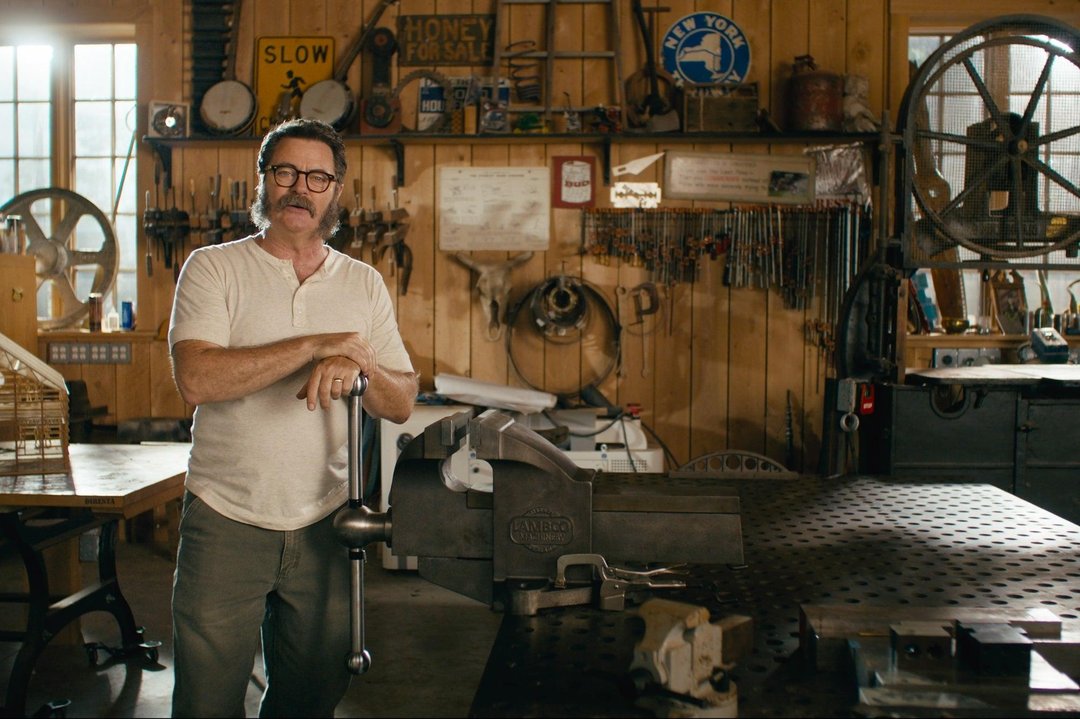This post was originally published on this site
Nick Offerman says he had “no idea” he would one day be considered an entrepreneur .
“It was much more of something I was obsessed with, that people were willing to pay a good price for,” Offerman told Entrepreneur in a video interview.
Offerman, 54, is the face of new educational content on American Express Business Class that aims to demystify small business ownership , a partnership he jokingly says is due to his “bucolic Midwestern charm” and ability to “sound like a layperson.”
But really, it’s because for the past 23 years, the actor, who is known for his roles in Parks and Recreation, The Last of Us, and Fargo, has led the Offerman Woodshop , a small collective in Los Angeles that handmakes everything from tables to ring boxes.
“I have spent many years of my life as an ignorant owner of a small business who really could have used a lot of this tutelage myself over the years,” Offerman said.
Nick Offerman
How Offerman Started His Business
Offerman’s dad was a furniture maker and many of his family members were farmers, so he learned how to build things at a young age, he shared. He says that by the time he was a teenager, he was skilled enough in carpentry to frame houses.
When Offerman went to theater school, the carpentry skills came with him. He began building scenery, then post and beam decks and cabins that required no nails or screws to put together. He likened the style to old-fashioned barn joinery or Japanese temple joinery.
“I tricked myself into becoming a woodworker through these post and beam decks and cabins,” Offerman said. “One day I realized, oh, if I shrink this down, it’s an antique French table.”
That realization came around the year 2000. It was right when Offerman met his wife, Megan Mullally, the Emmy-winning actress who played Karen Walker on NBC’s Will & Grace , and his life “got really happy all of a sudden.”
“I set myself up with an empty warehouse space and started making commissioned dining tables,” Offerman said.
The Offerman Woodshop officially opened in L.A. in 2001.
Setting Up Shop and Overcoming Challenges
After creating the business, Offerman began a process of trial and error, realizing there would be an overlap between making pieces he loved and pieces that clients would pay for. The “terrifying” part, at first, he said, was calculating what he should charge for his work.
Offerman says that his first hire was familiar with budgets and invoices, so they could confidently hand a client an invoice explaining why an heirloom table Offerman made cost what it did.
Now he charges anywhere from $45 for American cherry wood coasters to $4,500 for a walnut slab table.

Offerman’s team also helped by convincing him to get things like insurance.
“Insurance is a very smart thing to spend money on, especially when you’re running a barn full of saws,” he reflected.
Even with insurance and a plan for prices, getting a business off the ground “was scary in a way that it still is very daunting to me,” Offerman said.
Should I Expand My Business?
A pivotal challenge arose when the shop started to do well. Offerman was at the crossroads of choosing between expanding the business and making more money or keeping things in-house. His business manager at the time suggested that he produce his work in a factory to grow the business.
“And I said that’s not really why I have this shop,” Offerman said. “I would hate to turn anything into an assembly line or to give it any sort of repeatability because the whole point of this handcrafted furniture shop is the handcrafted part.”
The challenge now, he says, is making sure the four employees in his woodshop are happy, having fun, and not turning their lives into an assembly line. Because he doesn’t want to expand.
“How do I keep this business fruitful and keep it in the black without trying to grow it?” Offerman said. He added later, “The rule is, and it has been for many years, no robots in the shop.”
Acting as a Side Hustle
Even as he built his business, Offerman kept auditioning and landed small roles in Gilmore Girls and Miss Congeniality 2 before hitting it big as Ron Swanson in the hit NBC sitcom Parks and Recreation , which ran from 2009 to 2015.
When Offerman won awards and acclaim for his role as Swanson, the financial pressure on the business lessened.
“I now have a very cushy safety net that in my waitress gig as an actor, I’ve had some very good fortune,” he said.
The business may still be a balancing act, but Offerman’s acting career gives him enough leeway to cushion any possible falls. And when he’s not acting, he’s in the woodshop.
“I finish this acting job in October and then I have some months free,” Offerman said, referring to the upcoming Netflix historical drama Death By Lightning that he’s currently working on in Budapest, Hungary. “So then I’ll be in the shop all the time and that’s really fun.”
Meanwhile, Offerman manages the business from afar. When we spoke, he had just gotten off the phone about some renovations to the shop.
“I think that part of its vitality is that it never becomes boring,” Offerman said. “There’s always a new challenge coming up.”
Enjoy Entrepreneur Magazine on your terms. For just $10.99, get 1-year of the print edition delivered straight to your mailbox and 1-year instant access to the digital edition on your mobile device. Subscribe Now!
